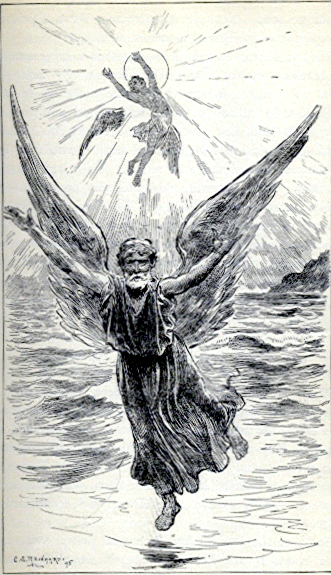Story of the Greeks - Helene Guerber |
STORY OF DAEDALUS AND ICARUS
Hellen, Deucalion's second son, finding Thessaly too small to give homes to all the people, went southward with a band of hardy followers, and settled in another part of the country which we call Greece, but which was then, in honor of him, called Hellas, while his people were called Hellenes, or subjects of Hellen.
When Hellen died, he left his kingdom to his three sons, Dorus, Æolus, and Xuthus. Instead of dividing their father's lands fairly, the eldest two sons quarreled with the youngest, and finally drove him away. Homeless and poor, Xuthus now went to Athens, where he was warmly welcomed by the king, who not only treated him very kindly, but also gave him his daughter in marriage, and promised that he should inherit the throne.
This promise was duly kept, and Xuthus the exile ruled over Athens. When he died, he left the crown to his sons, Ion and Achæus.
As the Athenians had gradually increased in number until their territory was too small to afford a living to all the inhabitants, Ion and Achæus, even in their father's lifetime, led some of their followers along the Isthmus of Corinth, and down into the peninsula, where they founded two flourishing states, called, after them, Achaia and Ionia. Thus, while northern Greece was pretty equally divided between the Dorians and Æolians, descendants and subjects of Dorus and Æolus, the peninsula was almost entirely in the hands of Ionians and Achæans, who built towns, cultivated the soil, and became bold navigators. They ventured farther and farther out at sea, until they were familiar with all the neighboring bays and islands.
Sailing thus from place to place, the Hellenes came at last to Crete, a large island south of Greece. This island was then governed by a very wise king called Minos. The laws of this monarch were so just that all the Greeks admired them very much. When he died, they even declared that the gods had called him away to judge the dead in Hades, and to decide what punishments and rewards the spirits deserved.
Although Minos was very wise, he had a subject named Dædalus who was even wiser than he. This man not only invented the saw and the potter's wheel, but also taught the people how to rig sails for their vessels.
As nothing but oars and paddles had hitherto been used to propel ships, this last invention seemed very wonderful; and to compliment Dædalus, the people declared that he had given their vessels wings, and had thus enabled them to fly over the seas.
Many years after, when sails were so common that they ceased to excite any wonder, the people, forgetting that these were the wings which Dædalus had made, invented a wonderful story, which runs as follows.
Minos, King of Crete, once sent for Dædalus, and bade him build a maze, or labyrinth, with so many rooms and winding halls, that no one, once in it, could ever find his way out again.
Dædalus set to work and built a maze so intricate that neither he nor his son Icarus, who was with him, could get out. Not willing to remain there a prisoner, Dædalus soon contrived a means of escape.
 Dædalus and Icarus. |
He and Icarus first gathered together a large quantity of feathers, out of which Dædalus cleverly made two pairs of wings. When these were fastened to their shoulders by means of wax, father and son rose up like birds and flew away. In spite of his father's cautions, Icarus rose higher and higher, until the heat of the sun melted the wax, so that his wings dropped off, and he fell into the sea and was drowned. His father, more prudent than he, flew low, and reached Greece in safety. There he went on inventing useful things, often gazing out sadly over the waters in which Icarus had perished, and which, in honor of the drowned youth, were long known as the Icarian Sea.